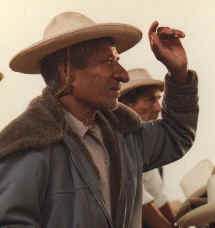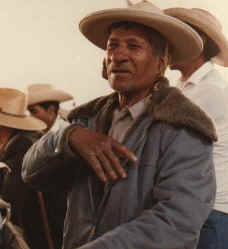 The present organization of the global food system thus decouples the logic of commercial activity from local needs in terms of resource use, environmental sustainability, employment and livelihood, and, indeed, food needs. But although, it is the realignment of the world food system which underlies these trends, they root themselves in localities through local power structures of various kinds. This is what makes it possible for local actors to contest them and, in some cases, modify them. This is one of the major concerns of anthropological studies of rural social conflict and everyday processes of "resistance" on the part of poorer rural people. But local power structures are also influenced by the support local elites may receive from higher levels of the national and global power structure. These higher agencies are often instrumental in replacing one kind of local elite by another, and in countries like Mexico today, even apparently "traditional" local elites may enjoy close relations with leading national and transnational economic actors. In these larger plays of power, the dilemmas facing local people can be very great. For example, we may have people with access to land being backed by NGOs in a struggle for sustainable development and autonomy, and trying to make use of alternative trading networks to find new markets for their products abroad amongst "concerned" consumers. In comes a transnational chicken company offering people without land jobs in the broiler houses and packing plant. Or in comes a group planning a hotel, condominum and casino complex, which will destroy local fishing and farming activities, but offer jobs in construction and long-term, if badly paid, jobs servicing the needs of affluent visitors in the future. All these scenarios are possible models of a place’s future inside or outside the global food system, but if they occur together, there may be no simple resolution of the conflicts of interest the alternatives will unleash. There is also the ongoing problem of the urban poor and how they are going to be fed. There has been a general shift throughout a more urbanised world from a focus on how farm incomes can be maintained to the interests of consumers and the environment. But the growth of urban poverty creates a particularly intractable kind of contradiction — poor people need cheap food, and the easiest way to give them that is to use genetic engineering and biotechnology and forget about the interests of small farmers.
The present organization of the global food system thus decouples the logic of commercial activity from local needs in terms of resource use, environmental sustainability, employment and livelihood, and, indeed, food needs. But although, it is the realignment of the world food system which underlies these trends, they root themselves in localities through local power structures of various kinds. This is what makes it possible for local actors to contest them and, in some cases, modify them. This is one of the major concerns of anthropological studies of rural social conflict and everyday processes of "resistance" on the part of poorer rural people. But local power structures are also influenced by the support local elites may receive from higher levels of the national and global power structure. These higher agencies are often instrumental in replacing one kind of local elite by another, and in countries like Mexico today, even apparently "traditional" local elites may enjoy close relations with leading national and transnational economic actors. In these larger plays of power, the dilemmas facing local people can be very great. For example, we may have people with access to land being backed by NGOs in a struggle for sustainable development and autonomy, and trying to make use of alternative trading networks to find new markets for their products abroad amongst "concerned" consumers. In comes a transnational chicken company offering people without land jobs in the broiler houses and packing plant. Or in comes a group planning a hotel, condominum and casino complex, which will destroy local fishing and farming activities, but offer jobs in construction and long-term, if badly paid, jobs servicing the needs of affluent visitors in the future. All these scenarios are possible models of a place’s future inside or outside the global food system, but if they occur together, there may be no simple resolution of the conflicts of interest the alternatives will unleash. There is also the ongoing problem of the urban poor and how they are going to be fed. There has been a general shift throughout a more urbanised world from a focus on how farm incomes can be maintained to the interests of consumers and the environment. But the growth of urban poverty creates a particularly intractable kind of contradiction — poor people need cheap food, and the easiest way to give them that is to use genetic engineering and biotechnology and forget about the interests of small farmers.
 This suggests that the problems of the world food system cannot be resolved entirely in the South, because their roots lie in great measure in Northern styles of consumption and global inequalities in income distribution. But it’s not exactly a matter of free choice and ethics even in Northern societies. Being a principled consumer and buying Café Direct costs more than buying Nescafé. The breakdown of the old Atlantic-centred food system and the shift of the balance of power from the exporting to the importing countries has undermined Northern farm lobbies and leaves the agro-food industries with little choice but to pursue the new technologies which can restore them competitiveness. Even a concern for the environment can produce pathological consequences in a world which is structured as ours is structured. Being an environmentally conscious consumer and buying organically grown vegetables may actually be encouraging some politically connected agricultural entrepreneur in the South to drive another bunch of subsistence farmers from the land.
This suggests that the problems of the world food system cannot be resolved entirely in the South, because their roots lie in great measure in Northern styles of consumption and global inequalities in income distribution. But it’s not exactly a matter of free choice and ethics even in Northern societies. Being a principled consumer and buying Café Direct costs more than buying Nescafé. The breakdown of the old Atlantic-centred food system and the shift of the balance of power from the exporting to the importing countries has undermined Northern farm lobbies and leaves the agro-food industries with little choice but to pursue the new technologies which can restore them competitiveness. Even a concern for the environment can produce pathological consequences in a world which is structured as ours is structured. Being an environmentally conscious consumer and buying organically grown vegetables may actually be encouraging some politically connected agricultural entrepreneur in the South to drive another bunch of subsistence farmers from the land.